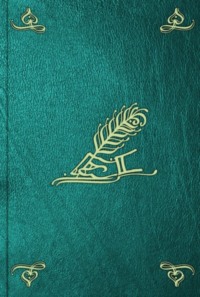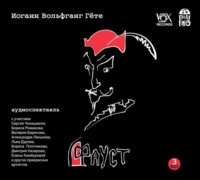 полная версия
полная версияLetters from Switzerland and Travels in Italy
Venice, Oct. 9, 1786.
Yesterday evening I ascended the tower of S. Mark's: as I had lately seen from its top the lagunes in their glory at flood time, I wished also to see them at low water; for in order to have a correct idea of the place, it is necessary to take in both views. It looks rather strange to see land all around one, where a little before the eye fell upon a mirror of waters. The islands are no longer islands – merely higher and house-crowned spots in one large morass of a gray-greenish colour, and intersected by beautiful canals. The marshy parts are overgrown with aquatic plants, a circumstance which must tend in time to raise their level, although the ebb and flow are continually shaking and tossing them and leave no rest to the vegetation.
Venice
I now turn with my narrative once more to the sea. – I there saw yesterday the haunts of the sea-snails, the limpets, and the crab, and was highly delighted with the sight. What a precious glorious object is a living thing! – how wonderfully adapted to its state of existence, how true, how real (seyend). What great advantages do I not derive now from my former studies of nature, and how delighted am I with the opportunity of continuing them! But as the present is a matter that admits of being communicated to my friends, I will not seek to excite their sympathy merely by exclamations.
The stone-works which have been built against the inroads of the sea consist first of all of several steep steps; then comes a slightly inclined plane, then again they rise a step, which is once more succeeded by a gently ascending surface, and last of all comes a perpendicular wall with an overhanging coping – over these steps – over these planes the raging sea rises until in extraordinary cases it even dashes over the highest wall with its projecting head.
The sea is followed by its inhabitants; – little periwinkles good to eat, monovalve limpets, and whatever else has the power of motion, especially by the pungar-crabs. But scarcely have these little creatures taken possession of the smooth walls, ere the sea retires again, swelling and cresting as it came. At first the crowd knows not where they are, and keep hoping that the briny flood will soon return to them – but it still keeps away; the sun comes out and quickly dries them up, and now begins the retreat. It is on these occasions that the pungars seek their prey. Nothing more wonderful or comical can be seen than the manœuvres of these little creatures, with their round bodies and two long claws (for the other spider-feet are scarcely worth noticing). On these stilted fore-legs, as it were, they stride along watching the limpets, and as soon as one moves itself under its shell on the rock, a pungar comes up and inserting the point of his claw in the tiny interstice between the shell and the rock turns it over, and so manages to swallow the oyster. The limpets, on the other hand, proceed cautiously on their way, and by suction fasten themselves firmly to the rocky surface as soon as they are aware of the proximity of their foe. In such cases the pungar deports himself amusingly enough; round and round the pulpy animal who keeps himself safe beneath his roof will he go with singular politeness; but not succeeding with all his coaxing and being unable to overcome its powerful muscle, he leaves in despair this intended victim, and hastens after another who may be wandering less cautiously on his way.
I never saw a crab succeed in his designs, although I have watched for hours the retreat of the little troop as they crawled down the two planes and the intermediate steps.
Venice, Oct. 10, 1786.
At last I am able to say that I have seen a comedy; Yesterday at the theatre of St. Luke, was performed "Le Baruffe-Chiozotte," which I should interpret the Frays and Feuds of Chiozza. The "dramatis personæ," are principally seafaring people, inhabitants of Chiozza, with their wives, sisters, and daughters. The usual noisy demonstrations of such sort of people in their good or ill luck – their dealings one with another, their vehemence, but goodness of heart, common-place remarks and unaffected manners, their naïve wit and humour – all this was excellently imitated. The piece, moreover, is Goldoni's, and as I had been only the day before in the place itself, and as the tones and manners of the sailors and people of the sea-port still echoed in my ears and floated before my eyes, it delighted me very much, and although I did not understand a single allusion, I was, nevertheless, on the whole, able to follow it pretty well. I will now give you the plan of the piece: – it opens with the females of Chiozza sitting, as usual, on the strand before their cabins, spinning, mending nets, sewing, or making lace; a youth passes by and notices one of them with a more friendly greeting than the rest. Immediately the joking begins – and observes no bounds; becoming tarter and tarter, and growing ill-tempered it soon bursts out into reproaches; abuse vies with abuse; in the midst of all one dame more vehement than the rest, bounces out with the truth; and now an endless din of scolding, railing, and screaming; there is no lack of more decided outrage, and at last the peace-officers are compelled to interfere.
Venice
The second act opens with the Court of Justice. In the absence of the Podestà (who as a noble could not lawfully be brought upon the stage) the Actuarius presides. He orders the women to be brought before him one by one. This gives rise to an interesting scene. It happens that this official personage is himself enamoured of the first of the combatants who is brought before him. Only too happy to have an opportunity of speaking with her alone, instead of hearing what she has to say on the matter in question, he makes her a declaration of love. In the midst of it a second woman, who is herself in love with the actuary, in a fit of jealousy rushes in, and with her the suspicious lover of the first damsel – who is followed by all the rest, and now the same demon of confusion riots in the court as a little before, had set at loggerheads the people of the harbour. In the third act the fun gets more and more boisterous, and the whole ends with a hasty and poor denouement. The happiest thought, however, of the whole piece, is a character who is thus drawn, – an old sailor who from the hardships he has been exposed to from his childhood, trembles and falters in all his limbs, and even in his very organs of speech, is brought on the scene to serve as a foil to this restless, screaming, and jabbering crew. Before he can utter a word, he has to make a long preparation by a slow twitching of his lips, and an assistant motion of his hands and arms; at last he blurts out what his thoughts are on the matter in dispute. But as he can only manage to do this in very short sentences, he acquires thereby a sort of laconic gravity, so that all he utters sounds like an adage or maxim; and in this way a happy contrast is afforded to the wild and passionate exclamations of the other personages.
But even as it was, I never witnessed anything like the noisy delight the people evinced at seeing themselves and their mates represented with such truth of nature. It was one continued laugh and tumultuous shout of exultation from beginning to end. I must, however, confess that the piece was extremely well acted by the players. According to the cast of their several parts, they had adopted among them the different tones of voice which usually prevail among the inhabitants of the place. The first actress was the universal favorite, more so even than she had recently been in an heroic dress and a scene of passion. The female players generally, but especially this one, in the most pleasing manner possible imitated the twang, the manners, and other peculiarities of the people they represented. Great praise is due to the author, who out of nothing has here created the most amusing divertissement. However, he never could have done it with any other people than his own merry and lighthearted countrymen. The farce is written throughout with a practised hand.
Of Sacchi's company, for whom Gozzi wrote (but which by-the-by is now broken up), I saw Smeraldina, a short plump figure, full of life, tact, and good humour. With her I saw Brighella– a slight well-made man and an excellent actor, especially in pantomime. These masks which we scarcely know except in the form of mummings, and which to our minds possess neither life nor meaning, succeed here only too well as the creation of the national taste. Here the most distinguished characters, persons of every age and condition, think nothing of dressing themselves out in the strangest costumes, and as for the greater part of the year they are accustomed to wander about in masks, they feel no surprise at seeing the black visors on the stage also.
Venice, October 11, 1786.
Since solitude, in the midst of a great crowd of human beings, is after all not possible, I have taken up with an old Frenchman, who knows nothing of Italian, and suspects that he is cheated on all hands and taken advantage of, and who, with plenty of letters of recommendation, nevertheless, does not make his way with the good people here. A man of rank, and living in good style, but one whose mind cannot go beyond himself and his own immediate circle – he is perhaps full fifty, and has at home a boy seven years old, of whom he is always anxious to get news. He is travelling through Italy for pleasure, but rapidly – in order to be able to say that he has seen it, but is willing to learn whatever is possible as he hurries along. I have shewn him some civilities, and have given him information about many matters. While I was speaking to him about Venice, he asked me how long I had been here, and when he heard that this was my first visit, and that I had only been here fourteen days, he replied: "Il paraît que vous n'avez pas perdu votre temps." This is the first "testimonium" of my good behaviour that I can furnish you. This is the eighth day since he arrived here, and he leaves us to-morrow. It was highly delicious to me, to meet in a strange land with such a regular Versailles'-man. He is now about to quit me! It caused me some surprise to think that any one could ever travel in this temper without a thought for anything beyond himself, and yet he is in his way a polished, sensible, and well conducted person.
Venice, Oct. 12, 1786.
Venice
Yesterday at S. Luke's a new piece was acted: —L'Inglicismo in Italia (the English in Italy). As there are many Englishmen living in Italy, it is not unnatural that their ways and habits should excite notice, and I expected to learn from this piece what the Italians thought of their rich and welcome visitors. But it was a total failure. There were, of course, (as is always the case here,) some clever scenes between buffoons, but the rest was cast altogether in too grave and heavy a mould, and yet nob a trace of the English good sense: plenty of the ordinary Italian commonplaces of morality, and those, too, upon the very commonest of topics.
And it did not take: indeed, it was on the very point of being hissed off the stage. The actors felt themselves out of their element – not on the strand of Chiozza. As this was the last piece that I saw here, my enthusiasm for these national representations did not seem likely to be increased by this piece of folly.
As I have at last gone through my journal and entered some occasional remarks from my tablets, my proceedings are now enrolled and left to the sentence of my friends. There is, I am conscious, very much in these leaves which I might qualify, enlarge upon, and improve. Let, however, what is written, stand as the memorial of first impressions, which, if not always correct, will nevertheless be ever dear and precious to me. Oh that I could but transmit to my friends a breath merely of this light existence! Verily to the Italian, "ultramontane" is a very vague idea; and to me even – "beyond the Alps," rises very obscurely before my mind, although from out of their mists friendly forms are beckoning to me. It is the climate only that seduces me to prefer awhile these lands to those; for birth and habit forge strong fetters. Here, however, I could not live, nor indeed in any place where I had nothing to occupy my mind; but at present novelty furnishes me here with endless occupation. Architecture rises, like an ancient spirit from the tombs, and bids me study its laws just as people do the rules of a dead language, not in order to practise or to take a living joy in them, but only in order to enable myself in the quiet depths of my own mind to do honor to her existence in bygone ages, and her for ever departed glory. As Palladio everywhere refers one to Vitruvius, I have bought an edition of the latter by Galiani; but this folio suffers in my portmanteau as much as my brain does in the study of it. Palladio by his words and works, by his method and way, both of thinking and of executing, has brought Vitruvius home to me and interpreted him far better than the Italian translator ever can. Vitruvius himself is no easy reading; his book is obscurely written, and requires a critical study. Notwithstanding I have read it through cursorily, and it has left on my mind many a glorious impression. To express my meaning better: I read it like a breviary: more out of devotion, than for instruction. Already the days begin to draw in and allow more time for reading and writing.
God be praised! whatever from my youth up appeared to me of worth, is beginning once more to be dear to me. How happy do I feel that I can again venture to approach the ancient authors. For now, I may dare tell it – and confess at once my disease and my folly. For many a long year I could not bear to look at a Latin author, or to cast my eye upon anything that might serve to awaken in my mind the thoughts of Italy. If by accident I did so, I suffered the most horrible tortures of mind. It was a frequent joke of Herder's at my expense, that I had learned all my Latin from Spinoza, for he had noticed that this was the only Latin work I ever read; but he was not aware how carefully I was obliged to keep myself from the ancients – how even these abstruse generalities were but cursorily read by me, and even then not without pain. At last matters came to that pitch that even the perusal of Wieland's translation of the Satires made me utterly wretched; scarcely had I read two of them, before I was compelled to lay the book aside.
Venice
Had I not made the resolve, which I am now carrying into effect, I should have been altogether lost – to such a degree of intensity had the desire grown to see these objects with my own eyes. Historical acquaintance with them did me no good; – the things stood only a hand's-breadth away from me; but still they were separated from me by an impenetrable wall. And, in fact, at the present moment, I somehow feel as if this were not the first time that I had seen these things, but as if I were paying a second visit to them. Although I have been but a short time in Venice, I have adapted myself pretty well to the ways of the place, and feel confident that I shall carry away with me, though a very incomplete, yet, nevertheless, clear and true idea of it.
Venice, Oct. 14, 1786. 2 o'clock, morning.
In the last moments of my stay here: for I am to start almost immediately with the packet-boat for Ferrara. I quit Venice without reluctance; for to stay here longer with any satisfaction and profit to myself, I must take other steps which would carry me beyond my present plan. Besides everybody is now leaving this city and making for the beautiful gardens and seats on the Terra-Firma; I, however, go away well-loaded, and shall carry along with me its rich, rare, and unique image.
FROM FERRARA TO ROME
Oct. 16, 1786.
Early and on board the packet.
My travelling companions, male and female alike, are all still fast asleep in their berths. For my part I have passed the two nights on deck, wrapped up in my cloak. It was only towards morning that I felt it at all cold. I am now actually in latitude forty-five, and yet go on repeating my old song: I would gladly leave all to the inhabitants of the land, if only, after the fashion of Dido, I could enclose enough of the heavens to surround our dwellings with. It would then be quite another state of existence. The voyage in this glorious weather has been most delightful, the views and prospects simple but agreeable. The Po, with its fertilizing stream, flows here through wide plains; nothing, however, is to be seen but its banks covered with trees or bushes; – you catch no distant view. On this river, as on the Adige, are silly water-works, which are as rude and ill-constructed as those on the Saal.
Ferrara, Oct. 16, 1786.
At night.
Although I only arrived here early this morning (by 7 o'clock, German time), I am thinking of setting off again to-morrow morning. For the first time since I left home, a feeling of dissatisfaction has fallen upon me in this great and beautiful, but flat and depopulated city. These streets, now so desolate, were, however, once kept in animation by a brilliant court. Here dwelt Ariosto discontented, and Tasso unhappy, and so, we fancy, we gain edification by visiting such scenes. Ariosto's monument contains much marble – ill arranged; for Tasso's prison, they shew you a wood-house or coalhouse where, most assuredly, he never was kept. Moreover, the people pretend to know scarcely anything you may ask about. But at last for "something to drink" they manage to remember. All this brings to my mind Luther's ink-spots, which the housekeeper freshens up from time to time. Most travellers, however, are little better than our "Handwerksburschen" or stolling journeymen, and content themselves with such palpable signs. For my part I became quite sulky, and took little interest even in a beautiful institute and academy, which a cardinal, a native of Ferrara, founded and endowed; however, some ancient monuments, in the Ducal Palace, served to revive me a little; and I was put in perfect good humor by a beautiful conception of a painter, John the Baptist before Herod and Herodias. The prophet, in his well-known dress of the wilderness, is pointing indignantly at Herodias. Quite unmoved, she looks at the prince, who is sitting by her side, while the latter regards the prophet with a calm but cunning look; a white middle-sized greyhound stands before the king, while from beneath the robe of Herodias, a small Italian one is peeping – both giving tongue at the prophet. To my mind, this is a most happy thought.
Cento, Oct. 17, 1786.
Ferrara-Cento
In a better temper than yesterday, I write you to-day from Guercino's native city. It, however, is quite a different place: an hospitable well-built little town, of nearly 5000 inhabitants, flourishing, full of life, cleanly, and situated in a well cultivated plain, which stretches farther than the eye can reach. According to my usual custom, I ascended the tower. A sea of poplars, between which, and near at hand, one caught glimpses of little country-houses, each surrounded by its fields. A rich soil and a beautiful climate. It was an autumn evening, such as we seldom have to thank even summer for. The sky, which had been veiled all day, has cleared up, the clouds rolling off north and south towards the mountains, and I hope for a bright day to-morrow.
Here I first saw the Apennines, which I am approaching. The winter in this region lasts only through December and January: April is rainy – for the rest of the year beautiful weather, according to the nature of the season. Incessant rain is unknown. September here, to tell you the truth, was finer and warmer than August with you. The Apennines in the south have received a warm greeting from me, for I have now had enough of the plain. To-morrow I shall be writing at the foot of them.
Guercino loved his native town: indeed, the Italians almost universally cherish and maintain this sort of local patriotism, and it is to this beautiful feeling that Italy owes so many of its valuable institutions and its multitude of local sanctuaries. Under the management of this master, an academy of painting was formed here. He left behind him many paintings, which his townsmen are still very proud of, and which, indeed, fully justify their pride.
Guercino is here a sacred name, and that, too, in the mouths of children as well as of the old.
Most charmed was I with his picture, representing the risen Lord, appearing to his mother. Kneeling before Him, she looks upon Him with indescribable affection. Her left hand is touching His body just under the accursed wound which mars the whole picture. His hand lies upon her neck; and in order the better to gaze upon her, his body is slightly bent back. This gives to His figure a somewhat strange, not to say forced appearance. And yet for all that it is infinitely beautiful. The calm and sad look, with which He contemplates her, is unique and seems to convey the impression that before His noble soul there still floats a remembrance of His own sufferings and of hers, which the resurrection had not at once dispelled.
Strange has engraved the picture. I wish that my friends could see even his copy of it.
After it a Madonna won my admiration. The child wants the breast; she modestly shrinks from exposing her bosom. Natural, noble, exquisite, and beautiful.
Further, a Mary, who is guiding the arm of the infant Christ, standing before her with His face towards the people, in order that with uplifted fingers He may bestow His blessings upon them. Judged by the spirit of the Roman Catholic legends, this must be pronounced a very happy idea. It has been often repeated.
Guercino is an intrinsically bold, masculine, sensible painter, without roughness. On the contrary, his pieces possess a certain tender moral grace, a reposeful freedom and grandeur, but with all that, a certain mannerism, so that when the eye once has grown accustomed to it, it is impossible to mistake a piece of his hand. The lightness, cleanness, and finish of his touch are perfectly astonishing. For his draperies he is particularly fond of a beautiful brownish-red blend of colours. These harmonize very well with the blue which he loves to combine with them.
Bologna
The subjects of the other paintings are more or less unhappily chosen. The good artist has strained all his powers, but his invention and execution alike are thrown away and wasted. However, I derived both entertainment and profit from the view of this cycle of art, although such a hasty and rapid glance as I could alone bestow upon them, affords but little, either of gratification or instruction.
Bologna, Oct. 18, 1786.
Night.
Yesterday I started very early – before daybreak – from Cento, and arrived here in pretty good time. A brisk and well-educated cicerone having learned that I did not intend to make a long stay here, hurried me through all the streets, and into so many palaces and churches that I had scarcely time to set down in my note-book the names of them, and I hardly know if hereafter, when I shall look again at these scrawls, I shall be able to call to mind all the particulars. I will now mention, however, a couple or so of objects which stand out bright and clear enough as they afforded me a real gratification at the time.
First of all the Cecilia of Raphael! It was exactly what I had been told of it; but now I saw it with my own eyes. He has invariably accomplished that which others wished in vain to accomplish, and I would at present say no more of it than that it is by him. Five saints, side by side, not one of them has anything in common with us; however their existence, stands so perfectly real that one would wish for the picture to last through eternity, even though for himself he could be content to be annihilated. But in order to understand Raphael aright, and to form a just appreciation of him, and not to praise him as a god or as Melchisedec "without descent" or pedigree, it is necessary to study his masters and his predecessors. These, too, had a standing on the firm soil of truth; diligently, not to say anxiously, they had laid the foundation, and vied with each other in raising, step by step, the pyramid aloft, until, at last, profiting by all their labors, and enlightened by a heavenly genius, Raphael set the last stone on the summit, above which, or even at which, no one else can ever stand.









